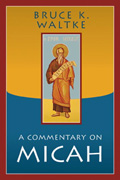
Bruce K. Waltke
Reviewed by: James J. Cassidy
A Commentary on Micah, by Bruce K. Waltke. Published by Eerdmans, 2007. Hardback, 490 pages, list price, $32.00. Reviewed by OP pastor James J. Cassidy.
Waltke has outdone himself with the current volume, as he stands against the critical scholars who believe in prophecies after the event, rather than the self-revelation of the triune God (p. 9ff.). Furthermore, Waltke affirms the priority of the New Testament (and the revelation of God in the person and work of Jesus Christ) for understanding fully the Old Covenant's diverse ways of revelation (p. 43). The idea of reading the Old Testament in light of the New Testament is much maligned today, even by many supposedly evangelical scholars.
Each section is treated in two parts. The first is an in-depth discussion of the Hebrew and the syntax of the text. Waltke here demonstrates an excellent grasp of lexicography, syntax, history, and archeology. The second section expounds the theology and applies the text in a competent and helpful way.
The average layperson will not benefit much from Waltke's discussions of Hebrew grammar. Nevertheless, there are not a few moments of dazzling theological insight and exposition. For example, in expounding Micah 1:2-7, he says: "The World Ruler is now envisioned as a victorious conqueror, as he rises from his heavenly throne, marches forth from his holy sanctuary, and strides upon tile earth's high places. Under the heat of his glowing wrath and under his heavy tread the eternal and majestic mountains melt and flow like hot wax, and the arable plains where man finds his immediate source of life split apart like waterfalls roaring down a rocky gorge. Nothing escapes nor remains. When this majestic God suddenly erupts with justice, puny man's proud walls and fortifications crumble and fall into ravines. Humans feel secure as long as the long-suffering God remains in heaven, but when he marches forth in judgment, they are gripped by the stark reality and gravity that they must meet the holy God in person" (p. 57). Waltke's treatment of Micah's eschatology in chapter 4 is almost worth the price of the volume by itself.
There are some shortcomings, however. I am not persuaded by his occasional application of the sins of Israel to modern-day America (see, for instance, p. 155). And at times one could wish that Waltke developed a more robust Christo-centric biblical theology. Even so, we have here a very helpful volume for preachers and serious expositors of the Hebrew text of Micah. It comes by this reviewer as highly recommended.
January 25, 2026
January 18, 2026
January 11, 2026
Texts that Transform: Church and Ministry
January 04, 2026
December 28, 2025
December 21, 2025
December 14, 2025
© 2026 The Orthodox Presbyterian Church